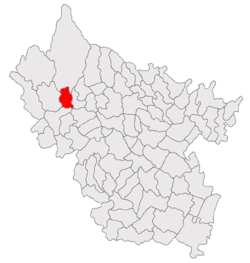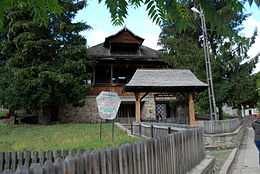Colți
| Colţi | |
|---|---|
| Commune | |
 Location of Colţi | |
| Coordinates: 45°37′N 26°39′E / 45.617°N 26.650°ECoordinates: 45°37′N 26°39′E / 45.617°N 26.650°E | |
| Country | Romania |
| County | Buzău County |
| First attested | 1508 |
| Component villages | Aluniş, Colţi, Colţii de Jos, Muscelul Cărămănesc |
| Government | |
| • Mayor | Ilie Sava (since 2004) (PD) |
| Population (2002) | |
| • Total | 1,335 |
| Postal code | from 127195 up to 127198 |
Colţi (Romanian pronunciation: [kolt͡sʲ]) is a commune in Buzău County, Romania, located in the Pătârlagele hollow, at the curvature of the Carpathian mountains, 13 km away from the town of Pătârlagele. It is composed of four villages: Aluniş, Colţi, Colţii de Jos and Muscelu Cărămăneşti.
Landmarks
The amber museum

Colţi is known for having been the only place in Romania where amber was extracted. The old amber mine has been closed since 1948, but the commune is the location of the only amber museum in Romania. The museum was opened in 1973 and exhibits pieces of amber and other minerals as well as deeds and documents that refer to amber mining.[1]
The most important exhibits are some pieces of amber that weigh over 1.5 kilograms, an earring with a piece of amber that preserves a 3 million year old ant, and another piece that kept the shape of the tree from whose resin it emerged.[1]
Amber is a common ornament for the people of Colţi, who wear amber pieces as good luck charms.
The Aluniş cave-church
6 km away from the commune's center lies the village of Aluniş, where medieval cave settlements can be found. A cave-church was dug in stone in 1274, by local shepherds, and served as a monastery until 1871. Since then, it has served as the village Eastern Orthodox church.
